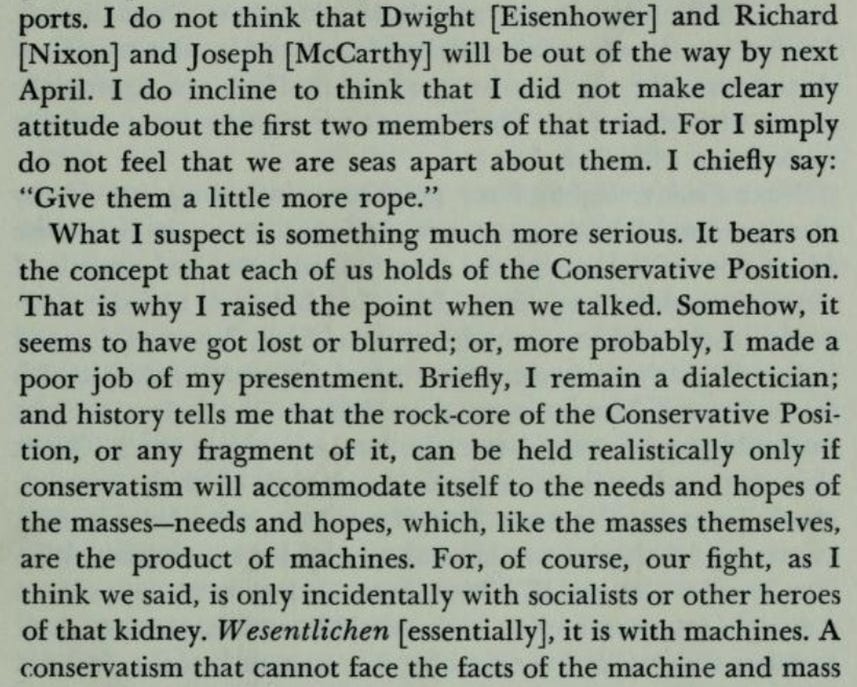“To live is to maneuver,” comes from a letter by the habitually poetic Whittaker Chambers. The letter itself was addressed to Willi Schlamm, an anti-communist emigre and aesthete Chambers knew from working at TIME Magazine. Chambers had copied the letter to William F. Buckley as well. It really was meant for both men, he said.
Buckley and Schlamm were in the process of launching a conservative journal - what would obviously become National Review. They wanted to recruit Chambers, who, irascibly, had his own ideas about the meaning of conservatism. While he himself would rage against the machine living in “the interstices” on his farm in Maryland, a practical conservatism must have something to say to modernity. It should never be mere “literary whimsy.” Hence, “to live is to maneuver.”
Verbose and grandiose, Chambers set himself up as a Tory against the world who nevertheless understood that conservatism could not truly follow his example.
Taken by the phrase, Buckley (who anthologized his entire correspondence with Chambers in Odyssey of a Friend) turned it into one of those cliches of the conservative movement. You know, “Ideas Have Consequences,” “Standing Athwart History…,” “My XYZ Problem, and Ours.” To Buckley, it meant that conservative principles should guide pragmatic decisions against the exigencies of the real world. Boy, did they.
I pick it as the name of this Substack for a few reasons.
One, living and maneuvering strikes me as a constant state. For me, it is especially true at this point in my life as I prepare to return to the academic or academic-adjacent work I have really only pursued avocationally for the past four years. It could almost be a personal motto for a pretty substantial transition for me.
Two, insofar as admire conservatism, it is often the sort that meets the world where it is. I still appreciate the conservatives comfortable in their own mind and being, but not detached from reality. I have always - and I will contradict this in a moment - associated the phrase with a more moderate form of conservatism. A practical, transactional, sober conservatism.
Three, there is, I think, a dark side to the injunction (as there so often is in right-wing history). If living is maneuvering, and the Right must work with what it has in front of it, then what is to stop conservatives embracing dangerous but successful, at least in the short term, movements or leaders. Since 2016, and of course before that, what I once thought of as a serious and principled movement capitulated to Donald Trump. The rationale from those who most loudly claim the conservative mantle has often been a version of, well, to live is to maneuver.
So we have in this cliche principle and pragmatism, moderation and extremism. It’s what I want to explore here.
In the letter, Chambers went on to say, “Those who remain in the world, if they will not surrender on its terms, must maneuver within its terms. That is render on its terms, must maneuver within its terms. That is what conservatives must decide: how much to give in order to survive at all; how much to give in order not to give up the principles.” Chambers saw the problem in 1955, and perhaps did not trust who called themselves conservative to succeed at the delicate balance.
As suggested above, I will be spending more time thinking and writing about conservative history. A big part of that will, with luck, be a book manuscript. I think of this Substack as something of a public notebook where I sketch ideas or post curios from my collection. I will also post links to essays I have published here and there with commentary on the background and thought process.
In all honesty, my posting schedule will be irregular; I can’t commit to regular updates, so I won’t. But I don’t intend to make this paid, either. So if you subscribe, you will get all my updates.
A tiny conservative history inside reference: When I reread the Chambers letter, I realized it also featured the phrase “a dance along a precipice.”
This was the title of George H. Nash’s dissertation, which became the foundational The Conservative Intellectual Movement in America since 1945. I told you Chambers was habitually poetic.










I encountered you on the Know Your Enemy podcast and really liked your thoughts - which is also where I discovered just how fascinating and humane Whittaker Chambers was behind his classic Ayn Rand take down. I am really looking forward to reading this!